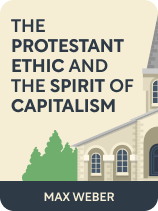

This article is an excerpt from the Shortform book guide to "The Protestant Ethic and the Spirit of Capitalism" by Max Weber. Shortform has the world's best summaries and analyses of books you should be reading.
Like this article? Sign up for a free trial here.
What’s Max Weber’s “iron cage”? Was his analysis and prediction about the modern world accurate?
Max Weber’s classic work The Protestant Ethic and the Spirit of Capitalism discusses the socio-economic and religious roots of modern capitalism—and of our productivity-focused culture. He ends the book with a reflection on the materialist bent of the modern world.
Let’s take a look at Weber’s view, Steven Pinker’s perspective, and some wisdom from a Chinese proverb.
Max Weber’s Iron Cage
To end his classic work, Weber laments the state of the modern world. He notes that, while the Protestants chose to live as they did, we now all have to. The capitalist world system has become so large that we now must submit to its pressures. Either you live a rational, systematic life, or you’ll end up on the bottom of the economic ladder.
In Weber’s view, we’ve also lost the magic of earlier ages. The world has become a “disenchanted” place, and everyone lives mechanically and without wonder. Our concern for material possessions rather than rich inner lives has become what Weber refers to as an “iron cage,” and he laments that we’ll be trapped in a drab capitalist world until we run out of fossil fuels and the whole system is forced to change.
Have Things Gone as Poorly as Weber Predicted?
Max Weber’s “iron cage” diagnosis—and his prognosis for the capitalist world system—were decidedly bleak. Here, it’s important to note that Weber was a member of a wealthy and well-connected family, so his position as an educated and powerful member of society likely colored his view. This is evident in his final words, where he expresses nostalgia for the end of an age—but an age that, for many, was marked by a much lower quality of life than Weber enjoyed.
Today, some would say that the world is doing better than ever before. That’s the argument that Steven Pinker makes in Enlightenment Now, where he cites data to support his view that life is getting better for humans around the world. Pinker makes the following claims:
- The European Enlightenment spread rationality, science, and humanism throughout the world. These values create better societies than old, superstitious values.
- The human brain has a “negativity bias” that causes us to see things in a negative light. This, as well as negativity-focused media, makes us think the world is worse off than it actually is.
- Various markers of human well-being have improved, such as longevity, child mortality, and the rate of poverty. Additionally, modern technologies have given people more leisure time and more opportunities to learn, travel, and enjoy life.
So while materialism abounds and some people do build their lives around possessions, standards of living have improved around the world, allowing for the spread of education, and leading to new forms of work and play. Here, a Chinese proverb sums up the situation: Sai Weng lost his horse / who can say whether good or bad (塞翁失马 / 焉知非福). In essence, this saying suggests that we can’t know quite what’s coming next and that it’s no use to make absolute judgments about the goodness or badness of a situation.

———End of Preview———
Like what you just read? Read the rest of the world's best book summary and analysis of Max Weber's "The Protestant Ethic and the Spirit of Capitalism" at Shortform.
Here's what you'll find in our full The Protestant Ethic and the Spirit of Capitalism summary:
- How the Protestant way of life lead to modern capitalism
- The history of the 16th-century Protestant reformation
- Why the Protestants were so distinctly prosperous






